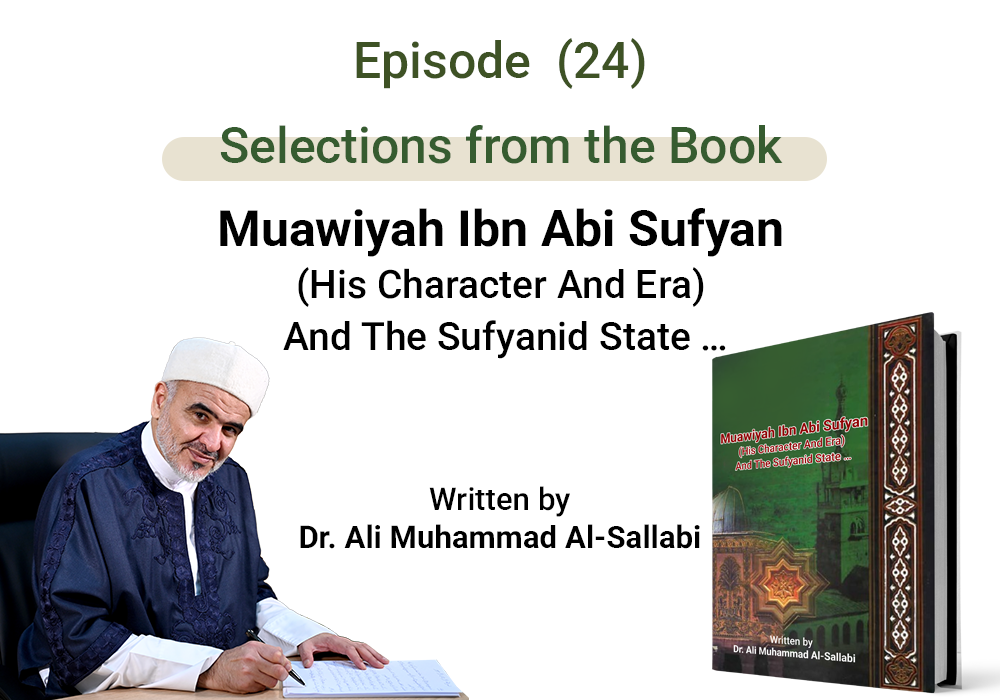Did Muawiyah Spread The Cursing Of The Commander Of The Faithful, Ali, On The Pulpits Of The Umayyad State?
Selections from the Book Muawiyah Ibn Abi Sufyan (His Character And Era) And The Sufyanid State …
Written by Dr. Ali Muhammad al-Sallabi...
Episode (24)
Historical sources mention that the governors from the Umayyads before Umar ibn Abd al-Aziz used to insult Ali, but this report mentioned by Ibn Sa'd is not authentic. Ibn Sa'd said: "Ali ibn Muhammad narrated to us, from Lut ibn Yahya, who said: The governors from the Umayyads before Umar ibn Abd al-Aziz used to insult a man, may Allah be pleased with him, but when Umar took power, he stopped that."
This report is weak. Ali ibn Muhammad is al-Mada’ini, who is weak, and his teacher, Lut ibn Yahya, is extremely weak. Yahya ibn Ma'in said about him: "He is not trustworthy". Abu Hatim said: "Abandoned in hadith". Al-Daraqutni said: "A weak storyteller". He is described in Al-Mizan as "a ruined storyteller who is not to be trusted", and most of his narrations are from the weak, the perished, and the unknown.
The Shia accused Muawiyah, may Allah be pleased with him, of ordering people to curse Ali and insult him from the pulpits of mosques. This claim has no basis in truth. What is worse is that some researchers adopted this fabrication without subjecting it to critical scrutiny or analysis, until it became among later scholars something taken for granted and no longer open to discussion. There is no authentic narration to support it, and what appears in the works of al-Dimiri, al-Ya’qubi, and Abu al-Faraj al-Isfahani cannot be relied upon.
Authentic historical records actually affirm the opposite of what those sources claim: that Muawiyah showed respect and appreciation for the Commander of the Faithful Ali and his pure household. The story of cursing Ali from the Umayyad pulpits does not align with the logic of events or the nature of the parties in conflict. When we refer to historical books contemporary with the Umayyads, we find no mention of this claim at all. It only appears in the works of later writers, who wrote under the Abbasid era with the aim of tarnishing the reputation of the Umayyads in the eyes of the Muslim public.
This claim was written by al-Mas’udi in Muruj al-Dhahab and by other Shia authors, and it later found its way into some Sunni historical works. However, there is no clear, authentic report in these works. It is a claim lacking reliable transmission, a sound chain free from criticism, and a text free from objection. The weight of this claim is well known among scholars and researchers. Muawiya, may Allah be pleased with him, is far above such accusations, based on what is established of his virtues in religion. His conduct in the ummah was commendable; some of the Companions praised him, and the best of the Followers spoke well of him, testifying to his faith, knowledge, justice, patience, and all other noble qualities.
This has indeed been affirmed regarding Muawiyah, may Allah be pleased with him. It is highly implausible that someone of such character would compel people to curse Ali, may Allah be pleased with him, from the pulpits—especially considering Ali's known virtue. Anyone who knows the leadership style of Muawiya, may Allah be pleased with him, and what he was famous for in terms of patience, forbearance, and wise governance of the people, would realize that this claim is among the greatest falsehoods attributed to him. Muawiya, may Allah be pleased with him, became a symbol of patience and an example for generations. The quality of forbearance in Muawiya’s character has been previously detailed.
As for what the Shia use from Sahih Muslim to support their claim, it does not prove what they allege. It is narrated from Amir ibn Sa’d ibn Abi Waqqas, from his father, who said: "Muawiyah ibn Abi Sufyan once said to Sa’d: 'What has prevented you from cursing Abu Turab?' Sa’d replied: 'Because of three things the Messenger of Allah (peace be upon him) said to him, I would never curse him. If I had one of them, it would be more beloved to me than red camels.'"
Al-Nawawi commented: This statement by Muawiyah does not explicitly mean he ordered Sa’d to curse him, but rather asked about the reason that prevented him from doing so—as if to say: Did you refrain out of reverence, caution, or something else? If it was out of reverence and respect, then you are right and praiseworthy. Perhaps Sa’d, who was among a group that cursed and yet refrained himself and was unable to prevent them, was asked this question.
They also suggested another possible interpretation: that Muawiyah’s question meant: "What has prevented you from criticizing his opinion and ijtihad, and showing the people that our view and ijtihad were sound, and that he erred?"
There are several reasons that prevent such a claim:
1- Muawiyah, may Allah be pleased with him, did not curse Ali, may Allah be pleased with him, as previously discussed, so how could he command others to curse him? Rather, he held him in high regard, acknowledged his virtue and precedence in Islam, as is evident in his own confirmed statements. Ibn Kathir said: It has been reported through multiple chains that Abu Muslim Al-Khawlani and a group with him entered upon Muawiyah and said to him: “Did you contend with Ali or are you his equal?” He replied: “By Allah, I know that he is better than me, more virtuous, and more deserving of the matter than I am.”
And it is narrated from Jarir ibn Abdul Hamid from Al-Mughira who said: When the news of Ali’s killing reached Muawiya, he began to weep. His wife said to him: “You cry over him when you fought him?” He replied: “Woe to you! You do not know what the people have lost of virtue, Fiqh, and knowledge.”
So is it reasonable, in terms of logic or religion, to believe that Muawiyah would curse Ali—or even instruct people to curse him—when he held such a belief about him?
2- There is no sound report that Muawiyah ever insulted or cursed Ali during their conflict while Ali was alive. So is it reasonable to believe that he would curse him after the war had ended and Ali had passed away? This is far from what rational minds would accept, and even more unlikely is that he would compel others to curse and insult him.
3- Muawiyah was an intelligent man, well-known for his wisdom and cleverness. If he had wanted to compel people to curse Ali—far be it from him—would he have asked someone like Saad ibn Abi Waqqas to do it? Saad, who was known for his courage, virtue, and piety, and who had not taken part in the conflict to begin with? Even the least intelligent of people wouldn’t attempt that—so how could Muawiya?
4- Muawiyah became the sole ruler after Hasan ibn Ali relinquished leadership to him, and unity was established under his rule, and the regions submitted to his authority. What benefit would there be in cursing Ali? On the contrary, wisdom and sound governance would dictate avoiding such actions, for the sake of calming tensions and restoring stability. Such reasoning would not be lost on Muawiyah.
5- After Muawiyah assumed sole leadership, there was closeness and familiarity between him and the sons of Ali, as is well-documented in historical biographies. For example, Al-Hasan and Al-Husayn visited Muawiyah, and he granted each of them two hundred thousand. He told them, “No one before me has given you such a gift”. Al-Husayn replied, “And you have not given anyone better than us”. On one occasion, Al-Hasan entered upon Muawiyah, who said to him, “Welcome, son of the daughter of the Messenger of Allah”, and ordered for him three hundred thousand. This clearly contradicts the false claims about Muawiyah compelling people to curse Ali. How could that be true, given this affection, closeness, and honor shown to Ali’s sons? This clarifies the truth in this matter and reveals the reality. Moreover, society as a whole was governed by the rulings of Islamic Sharia and was eager to uphold them. For that reason, they were far from slander, cursing, and vulgar or indecent speech. And the Messenger of Allah prohibited cursing the dead, even from among the idolaters—so how could anyone curse the righteous and reforming allies of Allah? As reported from Aisha: “Do not curse the dead, for they have reached the outcome of their deeds.”
- Ali Muhammad al-Sallabi, Muawiyah Ibn Abi Sufyan (His Character And Era) And The Sufyanid State, pp. 28-32.
- The Beginning and the End (8/139-140).
- Supporting the Companions and the Family, p. 277.
- The fifth of the Rashidun Caliphs, Al-Hasan ibn Ali ibn Abi Talib, p. 353.
For further information and review of the sources for the article, see:
The Book of “Muawiyah Ibn Abi Sufyan (His Character And Era) And The Sufyanid State” on the official website of Sheikh Dr. Ali Muhammad al-Sallabi:





